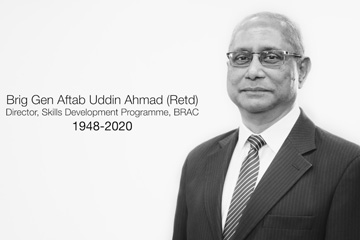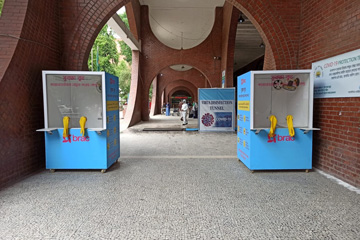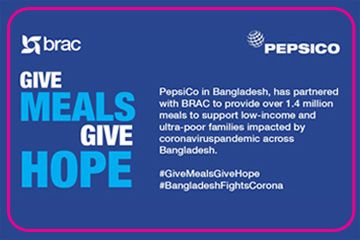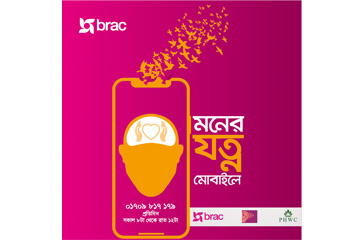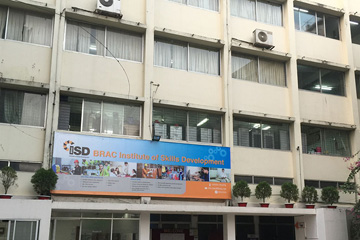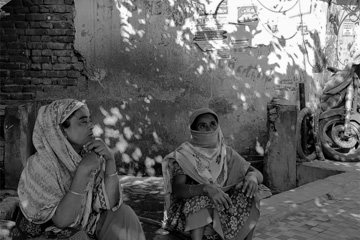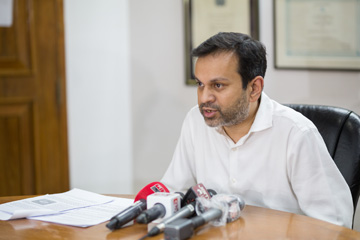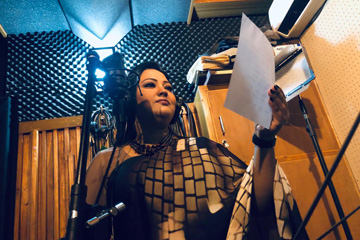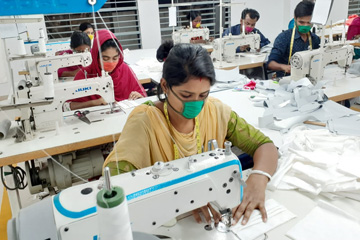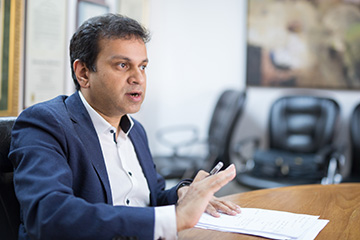
News (832)
We deeply mourn
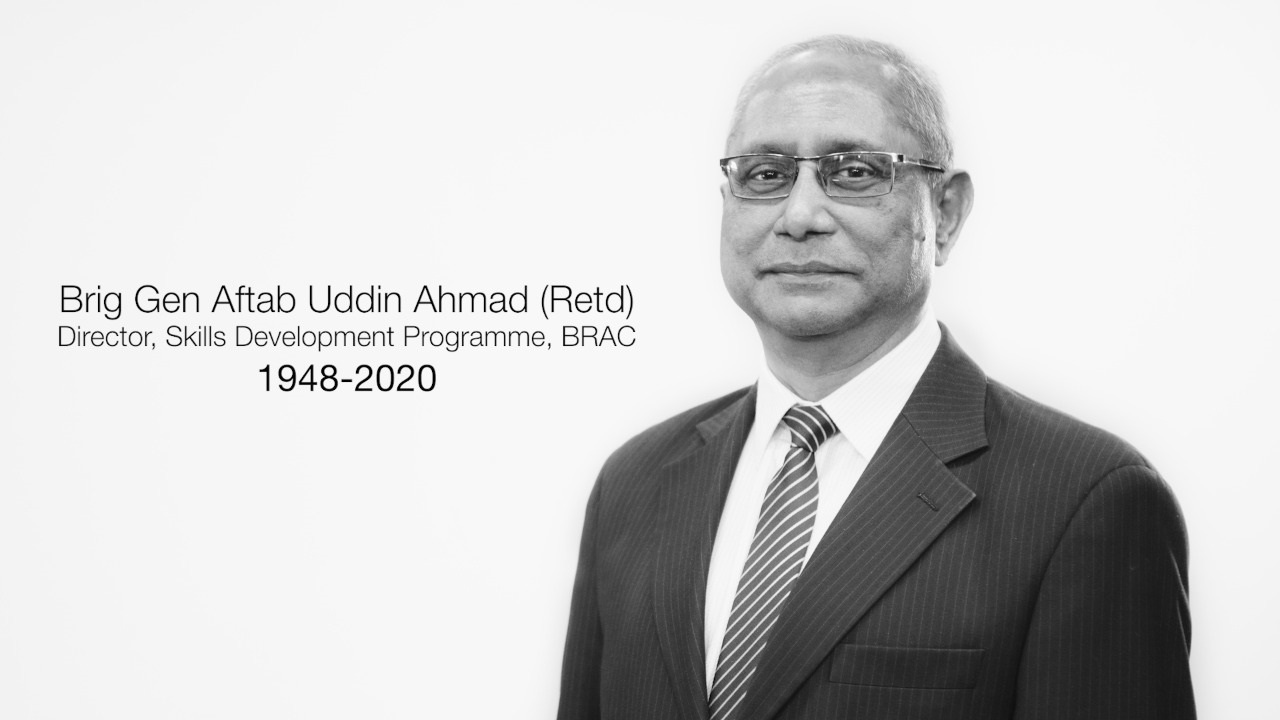
We are deeply saddened to share the passing of our esteemed colleague, Brig Gen Aftab Uddin Ahmad (Retd), Director of Skills Development Programme, BRAC. Inna Lillahi wa inna ilayhi raji'un.
He was admitted to hospital with complications in the lungs and had tested positive for COVID-19. He breathed his last at the Combined Military Hospital in Dhaka this afternoon. He was 72.
Mr Ahmad joined BRAC in October 2019. Prior to joining BRAC, he was the Chief Executive Officer of the Centre of Excellence for Bangladesh Apparel Industry (CEBAI) and was instrumental in the growth of the prominent skills development organisation UCEP Bangladesh. He was a Senior Consultant at the World Bank since 2014 under the STEP project. He also possesses over 27 years of prolific career in the Bangladesh Military Electrical and Mechanical Engineers.
His contribution in the technical and vocational education and training sector will be remembered forever. Recognition of Prior Learning (RPL) as a concept was initiated and implemented under his leadership. He was a key member of the national consultative committee for drafting the national skills development policy in 2011. In addition, he contributed to the formulation of the national education policy, non-formal education policy, technical and vocational education and training reforms, Education Watch 2013, and corporate social responsibility policy. He provided strategic leadership in implementing projects for numerous organisations including UNICEF, ILO, IKEA, Save the Children International, Asian Development Bank, Plan International, European Commission, Government of Bangladesh and Citibank, NA.
We are indebted for his guidance and leadership since he joined BRAC. He will be remembered for his unparalleled dedication to his work, and his long-standing commitment to public service in Bangladesh.
Brig Gen Aftab Uddin Ahmad (Retd) leaves behind a son and daughter, and a host of well-wishers. We extend our deepest condolences to his family and pray for his departed soul.
BRAC assisting DGHS to install 50 COVID-19 sample collection kiosks in Dhaka
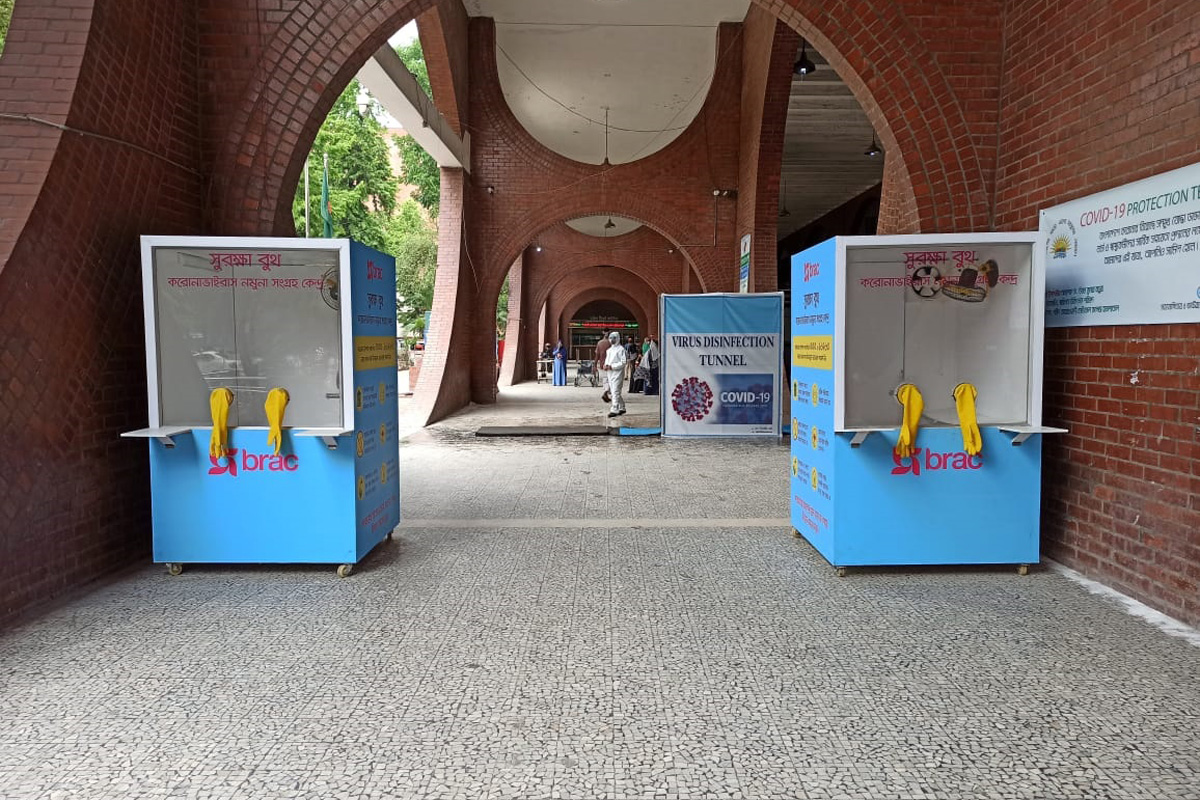
BRAC is assisting the Directorate General of Health Services (DGHS) to install walk-in sample collection booths (kiosk) in areas vulnerable to Novel Coronavirus outbreak across the country. As part of the initiative, at least 50 kiosks will be installed in Dhaka by next week to help speed up the process of sample collection. Fifty more kiosks will be set up across the country soon.
In line with the DGHS directives, BRAC is currently recruiting medical technologists, installing kiosks, collecting samples and transferring those samples to designated testing labs. The DGHS is also assisting BRAC in training technologists and providing sample collection kits to the organisation. A memorandum of understanding will soon be signed in this regard between BRAC and the DGHS.
While kiosks set up at hospitals will be operated by respective hospital staff, two trained medical technologists from BRAC will be collecting samples at the kiosks set up elsewhere. They will collect samples from suspected COVID-19 patients from 9am to 12pm Saturday through Thursday. Every day, technicians will be able to collect samples from 40 people having common symptoms of COVID-19 including fever, dry cough, fatigue, sore throat and respiratory difficulties. Once collected, the samples will be sent to testing facilities designated by the DGHS. Before that, suspected patients will have to fill-up forms prescribed by the DGHS providing personal information including phone numbers. Test results will be sent to respective individuals via text messages to the phone number they are stipulated to provide during sample collection at the kiosks.
Two methods of screening patients are being followed for sample collection. Initially, paramedics will screen suspected patients according to national definitions of cases and contacts. In addition, kiosks located in medical colleges or hospitals or adjacent to these facilities will collect samples from patients referred to them.
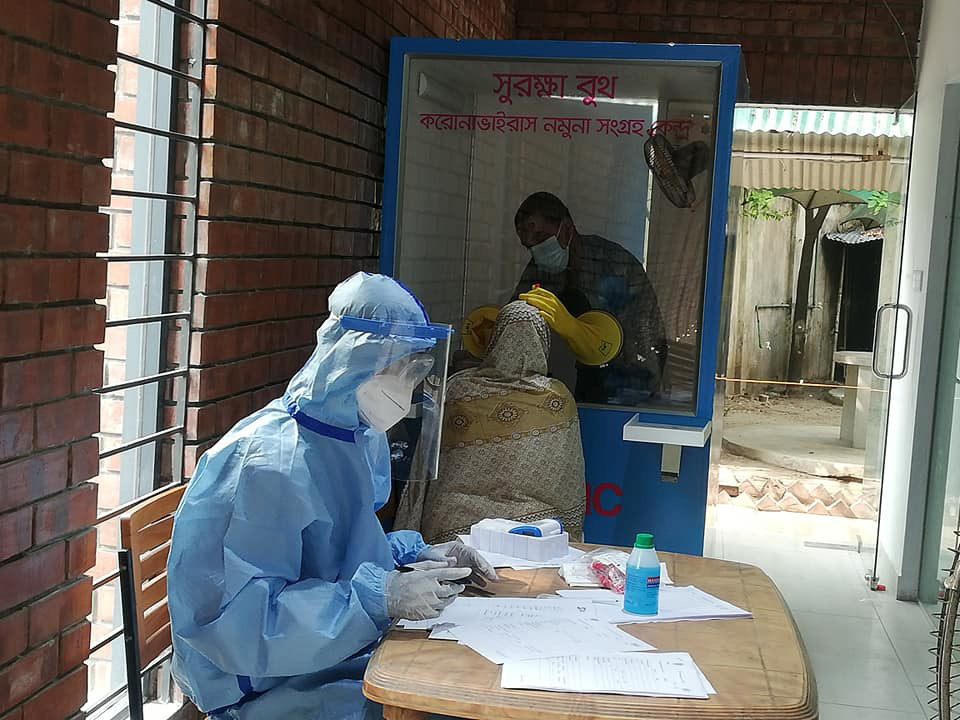 Elderly people, people with existing comorbidities, doctors, healthcare workers, staff at health facilities and those working in closed settings such as workplaces or classrooms will be prioritised for sample collection given the constraint in resources.
Elderly people, people with existing comorbidities, doctors, healthcare workers, staff at health facilities and those working in closed settings such as workplaces or classrooms will be prioritised for sample collection given the constraint in resources.
Associate Director of BRAC Health, Nutrition and Population Programme Morseda Chowdhury said, “We will set up 100 walk-in kiosks across 19 risky regions to expedite the government’s initiative of scaling up testing capacity along with the government's ongoing activities. Half of these kiosks will be set up in Dhaka.”
“Initially, we installed kiosks in Bangabandhu Sheikh Mujib Medical University and Shaheed Suhrawardy Medical College Hospital on a pilot basis. Later, more kiosks were set up at Sheikh Fazilatunnesa Mujib Memorial KPJ Specialised Hospital and Nursing College and in Narayanganj in line with the DGHS directive. We have also identified several spots to install kiosks in consultation with two Dhaka city mayors,” Chowdhury added.
As of 11 May 2020, Chowdhury said that 17 kiosks have been installed at 14 spots in Dhaka as per the DGHS directive and that work on installing more booths is in progress.
The institutions where the kiosks are already in operation include Bangabandhu Sheikh Mujib Medical University, Shaheed Suhrawardy Medical College Hospital, Sheikh Fazilatunnesa Mujib Memorial KPJ Specialised Hospital and Nursing College, Sheikh Hasina Burn and Plastic Surgery Institute, Government Unani and Ayurvedic Medical College and Hospital and Uttara Adhunik Medical College. Besides this, kiosks have started functioning at community centres located in Dhaka city corporation areas (Naya Paltan, Bashabo, Kamrangirchar, Naya Bazar, Jatrabari and Lalbagh). Two of those are adjacent to slums to serve the low-income population. Few more will cover areas of city corporations such as Uttara, Moghbazar, Mirpur, Mohammadpur, Uttarkhan, Dakkhinkhan and Baunia. Moreover, some more will be opened in different public and private hospital premises to cover more areas.
“BRAC is yet to receive any new funds in this regard. However, the organisation is diverting some of its funds from the Department for International Development (DFID) of the UK government to continue its proceedings,” Chowdhury said.
On Monday, 11 May 2020, Information Minister Dr Hasan Mahmud inaugurated a kiosk on the Dhaka Reporters Unity premises dedicated to collect samples from journalists for COVID-19 tests. Another kiosk will be inaugurated at the National Press Club soon.
BRAC partners with PepsiCo to provide over 1.4M meals to underserved families
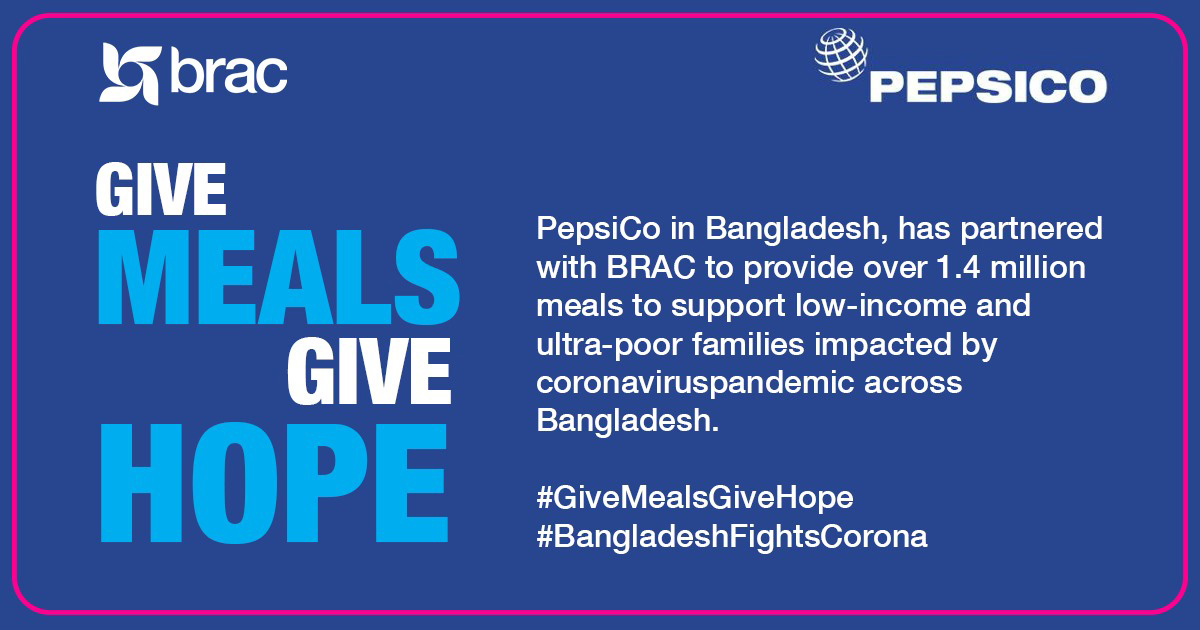
PepsiCo in Bangladesh, along with the global food and beverage company’s philanthropic arm, the PepsiCo Foundation, has partnered with BRAC, the world’s leading NGO to provide over 1.4 million meals to support low-income and ultra-poor families impacted by coronavirus pandemic across Bangladesh. This initiative is part of PepsiCo’s #GiveMealsGiveHope global programme.
As part of the partnership, BRAC, will be the on-ground implementation partner to provide dry rations to the low income and ultra-poor families in close collaboration with the Local administration including law enforcement authorities.
Debasish Deb, Country Manager, PepsiCo Bangladesh, said, “Bangladesh, like the rest of the world, is facing it’s biggest healthcare challenge. In response to the same, we are partnering with BRAC to provide meals, a critical requirement, to the communities most impacted by COVID-19 outbreak. We are committed to give our full support to the Government of Bangladesh in its fight against the pandemic and will continue to do our best to serve the Nation in these challenging times.”
Asif Saleh, Executive Director, BRAC, said, "Millions of daily wage earners and the ultra-poor have been hit hard by the economic aftermath of the pandemic. A recent survey by BRAC reveals 14% low-income families do not have food at home. The generous meals support from PepsiCo Bangladesh is a timely and fitting solution for emergency food sustenance."
"BRAC has already initiated a cash assistance programme supporting 300,000 families to buy essential food supplies, however the need is far greater. PepsiCo’s support will help us to reach more vulnerable people at this critical time. BRAC will continue to prioritise the most vulnerable - the elderly, pregnant or lactating mothers, people with disabilities, women-headed households, people living in ultra-poverty and those who are not receiving support from any other sources,” he added.
PepsiCo globally has announced its commitment to fight the coronavirus pandemic. The major focus of this effort includes providing 50 million meals across countries through various partnerships.
Telecounselling service 'Moner Jotno Mobile E' For anxieties related to COVID-19
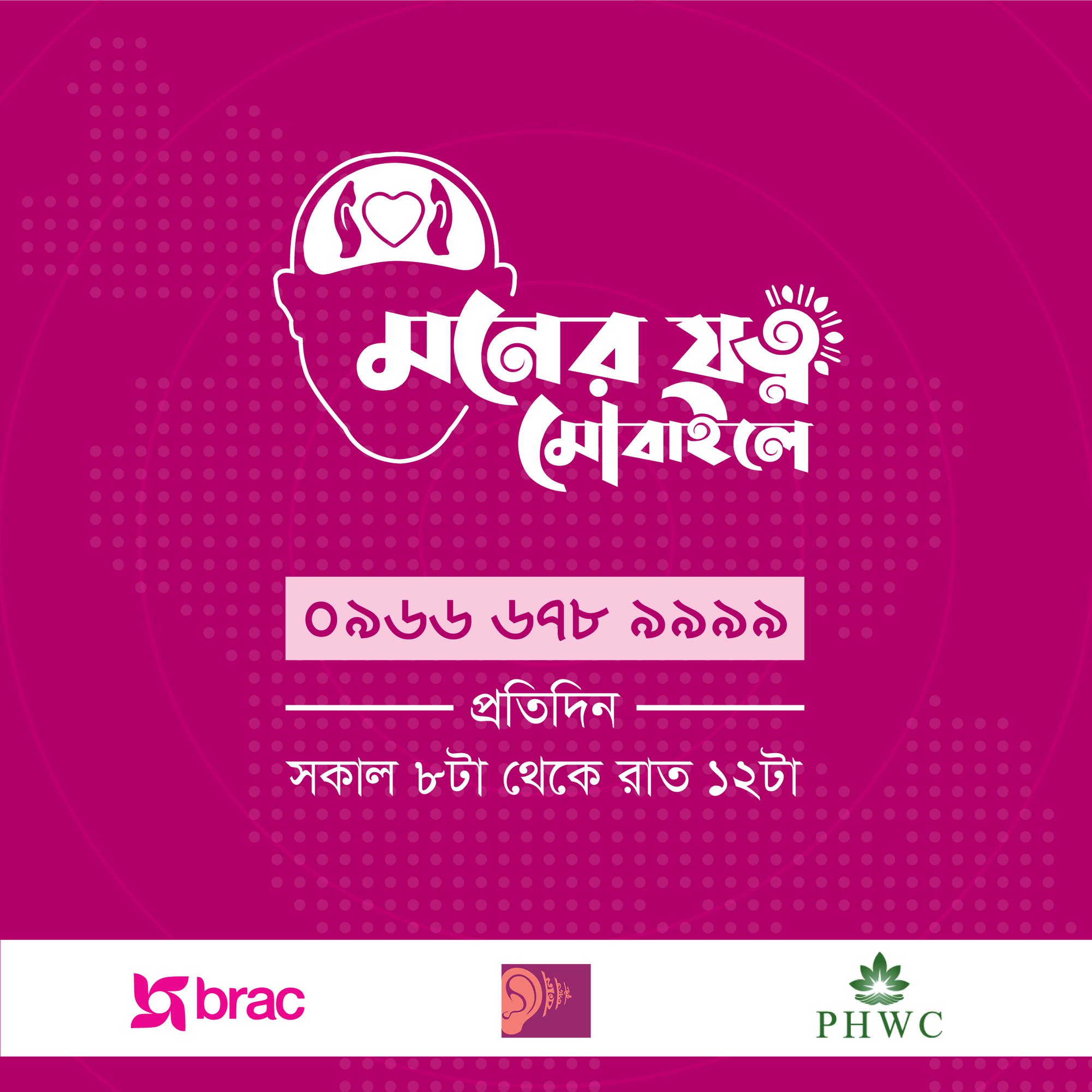
BRAC, Psychological Health and Wellness Clinic (PHWC), and the emotional support and suicide prevention hotline Kaan Petey Roi, have jointly launched 'Moner Jotno Mobile E', a telecounselling platform to provide emergency counselling support for citizens experiencing distress, frustration and stress caused by the COVID-19 pandemic.
The service was launched on Monday, 20 April 2020, and will be available across the country. The organisers stated that any citizen, irrespective of gender and socioeconomic background, will be able to seek support for the stress and frustration which may have arisen from the situation caused by the spread of Novel Coronavirus.
The hotline number 0966-678-9999 will be open from 8am till 12 midnight. Counsellors will directly pick the calls from the persons in distress.
Dr Erum Mariam, Executive Director of BRAC Institute of Educational Development said, "This collaborative effort aims at helping those who are experiencing a state of stress and anxiety in this unusual situation. Lockdowns, long stay at home and other social distancing measures enforced to contain the spread of the virus are causing confusion and distress among many of us, while many others are anxious about losing jobs. Expert counselling from platforms such as 'Moner Jotno Mobile E', which combines the expertise of BRAC, PHWC, and Kaan Petey Roi, can provide essential mental support to suffering individuals, so that they can better tackle this crisis and inspire a sense of hopefulness for the future.”
Organisers also said remote counselling using telephone is being globally advocated by experts, especially in a time of lockdowns such as the current pandemic, when people are often unable to get out of home to seek support.
Under 'Moner Jotno Mobile E' initiative, a team of 28 psychologists and counsellors, trained in general psychology, counselling psychology and clinical psychology, will directly attend to the callers whose full confidentiality will be ensured. The professionals will provide an empathetic and comfortable space in which the callers will feel heard, valued and respected as well as encouraged to confide their distresses, enabling them to feel less isolated and separated. Telecounsellors will also support the callers with wellbeing tips and exercise suggestions, which will hopefully ease their distress and anxiety.
The organisers further noted that if any caller expresses that they have symptoms of COVID-19, or manifests more serious psychological distress, they will be referred to other respective government-approved services for further attention and treatment.
BRAC hands over 430-room Learning Centre in Ashkona as Government quarantine centre
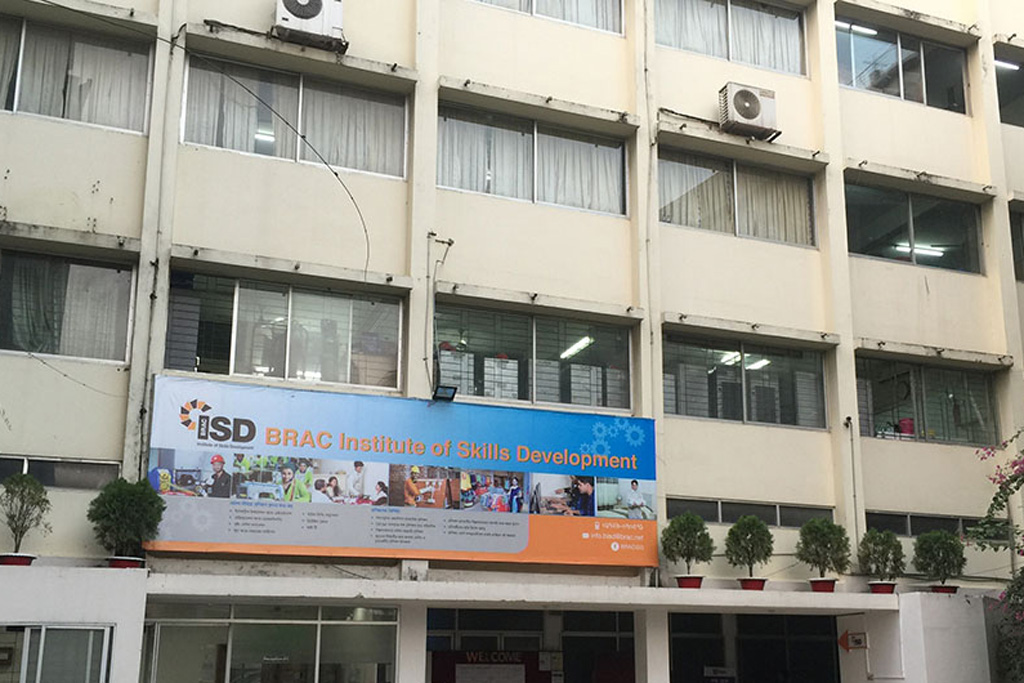
BRAC handed over its 430-room learning centre at Ashkona to the government today on Thursday (16 April) to use it as a quarantine facility for returnee migrants.
Also under a partnership with the government in a pilot project, BRAC has started collecting COVID-19 related community-level data from today (April 16) at the union level.
BRAC is further set to start kiosk-based COVID-19 testing separately at Bangabandhu Sheikh Mujib Medical University in Dhaka and Narayanganj on a pilot basis.
Asif Saleh, Executive Director, BRAC, said all returnees from abroad should stay in quarantine for 14 days for public safety and safety of their family members, which they will be able to do with relative ease if there are suitable quarantine facilities adjacent to Dhaka.
“This idea and commitment to the society has led BRAC to hand its relatively large learning centre at Ashkona to the government," he said.
BRAC executive director urged individuals and organisations with means to join its fundraising initiative so that assistance can be reached to more people living in ultra-poverty and in urban slums. For details on its fundraising initiative please visit: https://www.brac.net/covid19/donate/.
BRAC has been conducting a nationwide massive community awareness campaign since the outbreak of coronavirus in the country. As a partner of the Bangladesh government’s COVID-19 response plan, over 100 thousand of its staff, health workers and volunteers are deployed to conduct the campaign jointly with local administration and public representative bodies.
So far, more than 600,000 sachets of liquid soap, soap bars and hand sanitiser have been distributed across the country. Health workers and mass people received more than 55,000 surgical masks and 81,000 gloves for personal protection against COVID-19.
BRAC has already started manufacturing reusable masks and personal protective equipment (PPE) through its hygienic home-based production units and distributed approximately 350,000 masks and 2,150 PPEs.
Alongside running an extensive information, education and communication campaign at community level, BRAC is also conducting mass and digital media campaigns to sensitise people with messages of respiratory hygiene, social distancing, coughing etiquettes and hand washing. Renowned physicians, artists, policymakers and senior BRAC officials have joined the campaigns to raise awareness. For campaign details and content please visit http://www.brac.net/covid19/
14 percent low-income families do not have food at home
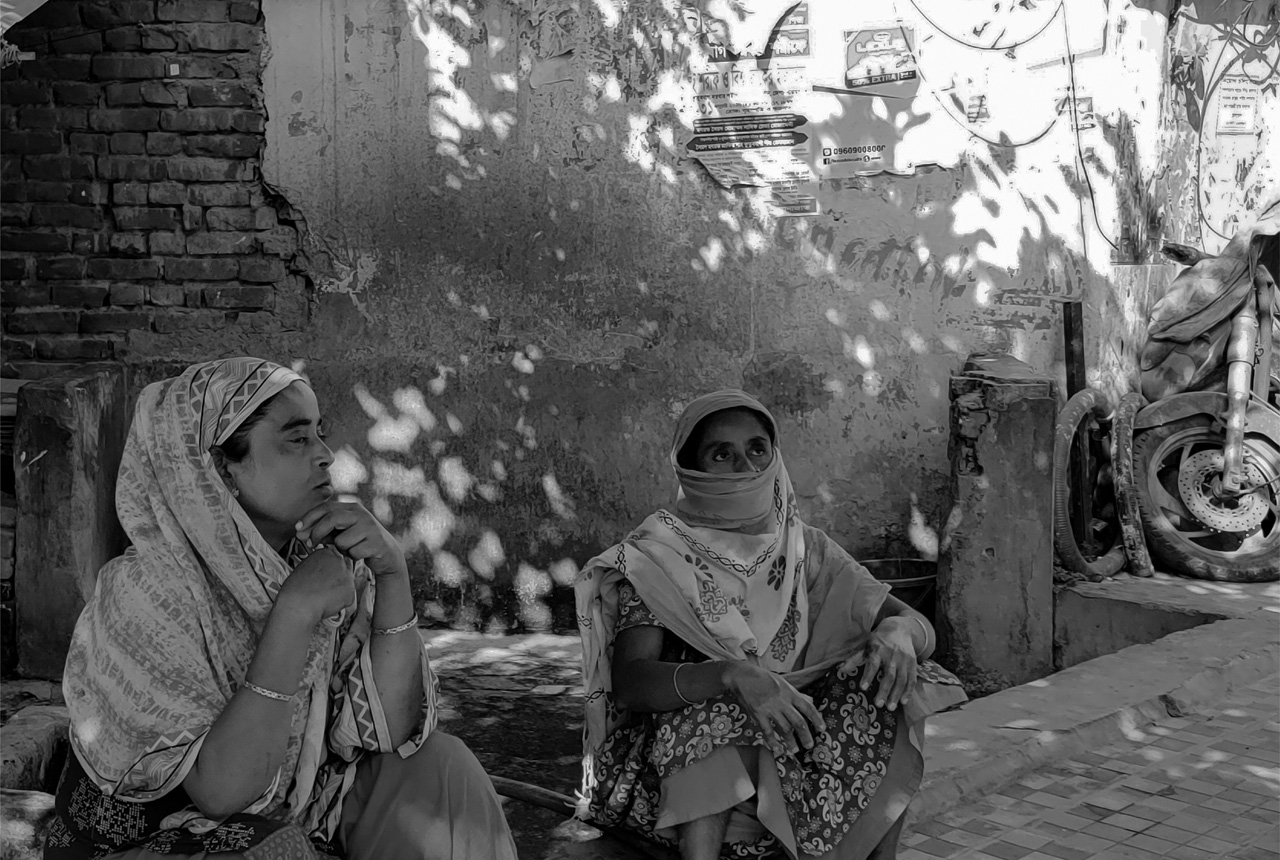
Focused awareness campaign urgent on symptoms, management and treatment
Low-income families of the country are suffering a great decline in their earnings since the enforcement of social distancing measures and lockdowns to fight COVID-19. Extreme poverty has hiked 60 percent than before, while 14 percent people do not have any food at home.
On the other hand, 36 percent of the people do not have any clear idea about measures to be taken to prevent COVID-19. Most people lack understanding of the message that one should not directly go to any healthcare facility with symptoms of the infection (fever, cough, breathing problem). Fifty-three percent of the respondents said they would suggest neighbours with these symptoms to go to an urban hospital or public healthcare centre. Only 29 percent said they would ask the patient to call the helplines.
This picture of economic impact and disease perception came through a countrywide survey conducted by BRAC. A total of 2,675 respondents from low-income backgrounds in all 64 districts participated in the survey carried out from 31 March - 5 April 2020. BRAC's advocacy for social change programme conducted the survey with assistance from other programmes, namely microfinance, urban development programme and the partnership strengthening unit.
Based on the scenario drawn through the survey, a number of recommendations have also been made, including the following ones.
Focused large-scale awareness campaigns on prevention, management and treatment should run on TV and social media. Food assistance must be immediately reached to the millions of households suffering from acute food shortage across the country, to halt them from leaving their homes to find work to feed their families. People who have returned to villages from urban centres are not enrolled in any social safety net programmes and so need proper delivery mechanisms to get food aid immediately. Special attention is needed to keep the agricultural value chain from stalling. Plummeting prices of agricultural products and costly transportation costs can increase rural poverty and create social unrest. The harvesting of boro rice will start from mid-April to continue till the end of May. Advance purchase of crops by the government can ensure the required money for the farmers to start harvesting. Plans and mechanisms should be devised to financially assist the rural businesses to recover loss and be operative again.
Some of the other noteworthy data and information derived from the survey are as follows:
Impact on earning and food security
The impact of reduction in earning is catastrophic for the communities surveyed. Before the pandemic started, the per capita income of 24 percent of the respondents were below the national lower poverty line, and 35 percent were below the national upper poverty line. Following the loss of income, the same share has increased to 84 percent and 89 percent respectively. It means 89 percent of the respondents now live in extreme poverty. It also means that extreme poverty has risen by 60 percentage points and poverty by 54 percentage points among the respondents.
The average household income of the 2,675 respondents was BDT 14,599 before the COVID-19 epidemic. Of them, 93 percent of the respondents reported a decline in income due to the outbreak. During March 2020, their average income stood at BDT 3,742, which represents an average 75 percent decline from their family income of last month. People in Chattogram (84 percent), Rangpur (81 percent) and Sylhet (80 percent) divisions reported higher decline in income.
Due to the public holiday and lockdowns to enforce social distancing measures, 72 percent of the respondents reported job loss or reduced work opportunities, and eight percent of the respondents, who are still employed, have not received their payment.
Those engaged in non-agricultural wage labour experienced more loss of income (77 percent), than the wage labourers in the agriculture sector (65 percent). Fifty-one percent of the rickshaw pullers, 58 percent of the factory workers, 66 percent hotel/restaurant workers, and 62 percent day labourers in non-agricultural sectors reported their income reduced to zero in the current month.
Awareness of the disease
Out of the respondents, 99.6 percent have heard about the disease, and 66 percent have first heard about it from television. Only 40 percent of the respondents mentioned isolation/quarantine as a possible treatment option. Men are more informed (60 percent) about whom to contact or what to do if one gets infected by coronavirus compared to women (38 percent). Of the respondents, 48 percent think that government hospitals do not treat COVID-19 patients and nine percent have no idea what to do if anyone contracts the disease.
Reaction on the public response
Sixty-eight percent of the people supported the government’s declaration of public holidays to prevent the spread of COVID-19. Only about seven percent disagreed. There is a general agreement among the respondents that the government may extend the public holiday by an average of 22 days. Majority (64 percent) respondents believed that the holiday might be extended by more than 14 days.
Majority (64 percent) of the respondents felt that the government is doing enough to tackle the epidemic, though 31 percent in rural areas and 40 percent of respondents in urban areas disagreed. Only four percent of the respondents have received any emergency relief support as of 5 April 2020.
Forty-seven percent of the respondents prefered food aid, while 20 percent wanted cash support. Rural respondents are more interested in receiving food (50 percent in rural, 44 percent in urban) support.
Coping Mechanism
Thirty-six percent of the respondents do not have any idea how they may cope with the loss of income. Twenty-three percent of the total respondents (38 percent among women) hope that the government will support them in case the crisis lingers on. Urban residents are more hopeful about government support than the rural inhabitants. Nineteen percent of the respondents are planning to take some credit to support their families if the situation continues.
Report download here.
BRAC commits BDT 15 crore as emergency cash assistance for 100 thousand low-income families

BRAC has allocated a budget of BDT 150 million (15 crore) for low-income families in urban slums, semi-urban and hard-to-reach areas, whose livelihood have been impacted due to the social distancing measures of COVID-19 pandemic. Each family will be provided with BDT 1,500 as an emergency food assistance fund, starting from Thursday, 02 April 2020).
In the first phase, 100,000 families will be assisted with BRAC’s own fund, which is to be disseminated through its urban development programme, ultra-poor graduation programme, integrated development programme and the humanitarian programme.
Asif Saleh, Executive Director, BRAC, said on this initiative, "COVID-19 is a humanitarian crisis with a public health dimension. In countries like Bangladesh, it also has dire economic consequences. According to the World Bank, only 15 percent of Bangladesh’s population makes more than BDT 500 a day. Most villagers depend on remittances from the cities or abroad. Because this is a global crisis, people everywhere are out of work. Their income flow has stopped.”
“Our emergency assistance will be targeted towards low-income families who have lost their source of livelihoods due to the ongoing pandemic. We will support 100,000 such families. However, the requirements are far bigger. I urge compassionate individuals and organisations to come forward and help us scale up the initiative to reach many more,” he added.
Asif Saleh further said that this activity will be implemented in close coordination with the local public representatives and administration, particularly to avoid duplication.
BRAC’s assistance will enable a family of four to buy essential food items for two weeks. Low-income families in 12 city corporations, eight municipalities, 38 sub-districts, haor villages, neighbourhoods and market areas near river ports, as well as host communities living adjacent to the displaced Rohingya population camps in Cox's Bazar will receive this assistance. BRAC staff will carry out the operation with assistance from the local public representatives and communities.
BRAC has also launched a fundraising appeal to scale up the effort and increase the coverage. Individuals and any organisation can donate. Details are available on BRAC website: https://www.brac.net/covid19/donate/.
BRAC's urban development programme will lead the distribution among 61,000 families in 12 city corporations and eight municipalities. BRAC's ultra-poor graduation programme will carry out the operation in 38 sub-districts under which 16,000 families of hawkers, rickshaw and van pullers and domestic helps will receive the money. The BRAC Integrated Development Programme will provide the assistance to 8,000 families living in haor areas, and markets and neighbourhoods near river ports. Also, 15,000 families in the host communities in Ukhya and Teknaf sub-districts of Cox's Bazar will receive the assistance.
BRAC is also driving a nationwide hygiene awareness and behavioural change campaign with its network of over 100,000 staff, volunteers and healthcare workers with the support of local administrations.
It is distributing protective wear and hygiene products, and 568,095 units of liquid soap, bathing soap and sanitisers, and 106,519 units of protective wear such as masks and gloves were distributed to the staff and communities.
Additionally, 200,000 reusable masks and 2,000 PPE have been produced through hygienic, home-based production mechanisms which have already been distributed. More masks are in production right now.
BRAC is also running an extensive public awareness campaign through social media and mass media, involving eminent physicians and public health experts, policymakers, artists and BRAC's senior leadership team. Details are available on this dedicated portal: http://www.brac.net/covid19/.
Artist Momtaz calls to defeat Corona: Partners with BRAC
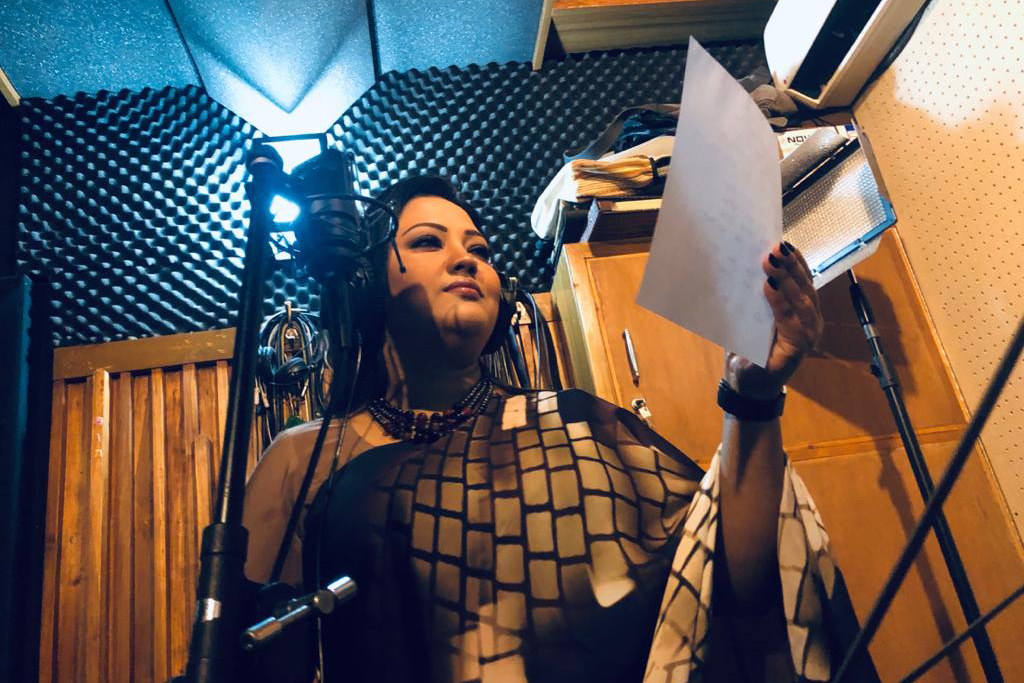
Dear people of my country/ Artist Momtaz is here/ Favourite with all of you/ Sharing a great feeling of mine/ When my friend coming back to homeland/ Thoughtful for good of others/ Locks himself up in home/ For 14 days on/ Wraps me in with/ A true feeling of goodness...
With these words, the iconic ‘Queen of Folk' starts her song that conveys awareness-raising messages to tackle COVID-19. As a part of its effort to sensitise mass people about the abiding rules of social distancing, hand washing and respiratory hygiene to tackle the pandemic, BRAC has paired with the eminent singer to launch this song on Tuesday, 31 March 2020.
Lyrics carrying life-saving messages with the tunes of a popular song of the artist, the song is expected to create a significant impact on the society, helping people adopt standard practices imperative to combat COVID-19.
As part of its series of digital and social media content for behaviour change communication, BRAC has already paired with Kuddus Boyati, one of the noted folk singers of Bangladesh, and released an informative song earlier. The composition has already attracted a great number of audience and engagements while being played on loudspeakers in cities, towns and villages across the country.
Artist Momtaz Begum, who is also a sitting Member of Parliament, said, "It is our duty to come forward during this national crisis and help people in any way we can."
Moutushi Kabir, Director of Communications and Outreach, BRAC and BRAC International, said "The most important arms to fight the pandemic at present is public awareness and change in our daily habits and behaviours. BRAC is actively supporting the Government of Bangladesh and partnering with a wide number of private sector and non-governmental organisations to fight COVID-19. We are grateful that popular artists like Momtaz Begum and Kuddus Boyati have come forward to help us in taking the message to the mass, especially in suburban and rural areas."
Ms Kabir also stressed the importance of active initiatives to counter the spread of fear and rumours around COVID-19 symptoms that is often barring people with fever, chest congestion or breathing conditions from accessing treatment from professional physicians or health facilities.
This is part of BRAC’s ongoing public awareness and behavioural change interventions to stop the spread and social transmission of COVID-19. The messages are relayed extensively in rural areas by BRAC’s frontline staff, reinforced through miking, social media and mass media promotion and cascaded through 16 community radio networks across Bangladesh.
BRAC starts production of reusable masks and prepares for production of PPE
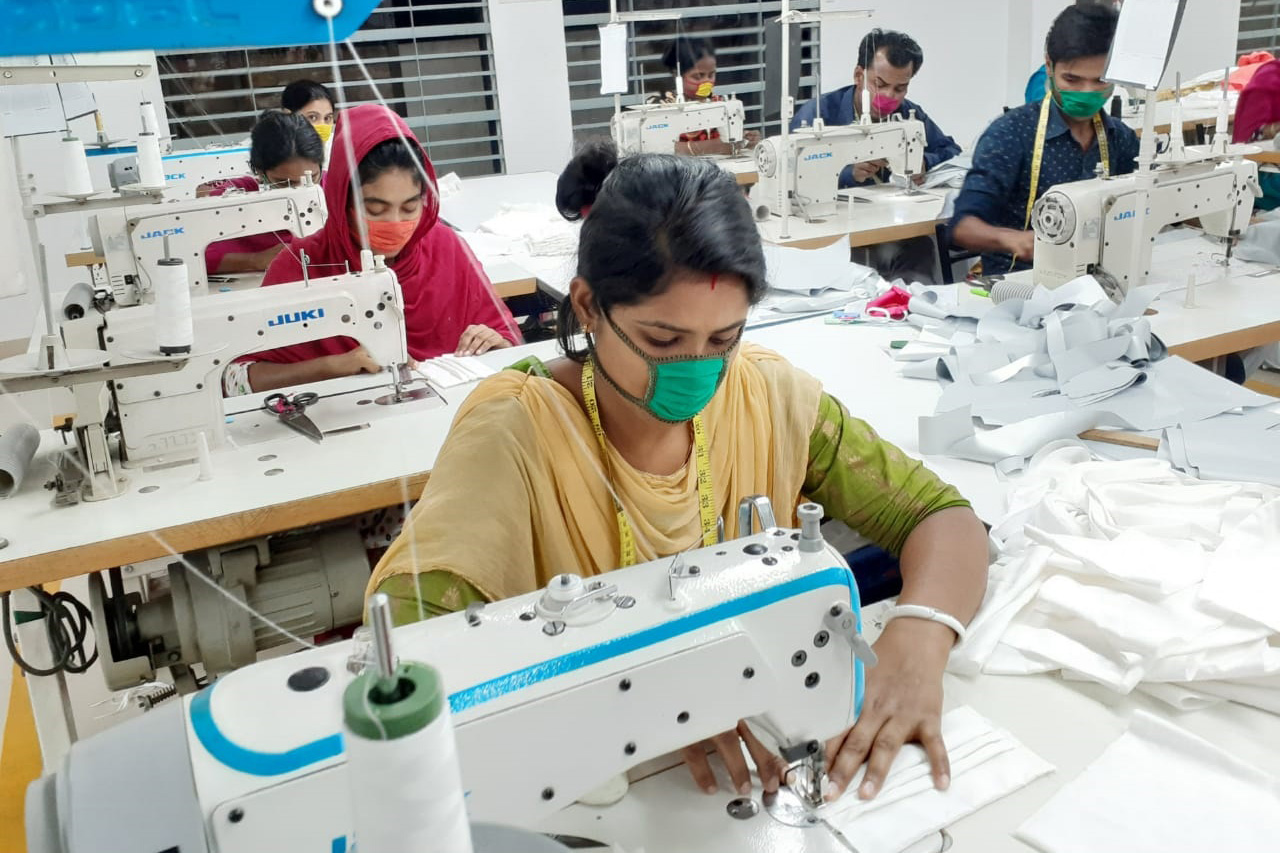
Millions of people reached with prevention messages and hygiene products
BRAC has started manufacturing over 2 lakh (200 thousand) pieces of reusable masks through its hygienic home-based production method for community use as part of the organisation's extensive campaign against COVID-19. It is also currently examining the production of personal protective equipment (PPE) and hopes to go into its production very soon.
Asif Saleh, executive director, BRAC, said in this regard, "We are rapidly expanding our capacity for effectively responding to the COVID-19 pandemic. Besides operating mass awareness campaign reaching to millions of people, we have now started production of protective wear. While we are manufacturing protective masks, we are exploring and building our capacity to manufacture PPE in our country. Once our production process is perfected following the scientific standards and standardized matrrial, we hope to go into large scale production. We then want to partner with BGMEA and other entities concerned under the government's guidance."
Meanwhile, over 50 thousand frontline healthcare providers of BRAC have started to implement its extensive awareness raising campaign to reach millions of people in 61 districts of Bangladesh to prevent COVID-19 along with distributing protective hygiene products. BRAC has also stopped collecting the installments from its microloan borrowers from 24 March to April 2. It is also running an extensive campaign at the Rohingya camps and host community as well in Cox's Bazar along with distributing soap bars and other necessary materials. In Urban slums and public hotspots it has set up hand washing stations and undertaking a disinfectant campaign in public transportations in partnership with city corporations.
So far, more than 8,500 members of BRAC staff have been provided with specific orientation on COVID-19 prevention and self-protection measures, enabling them to lead the community awareness campaign at the grassroots. More than 170,000 participants and clients of BRAC's development programmes have been briefed to strengthen community's own effort to prevent an outbreak of the disease. Over 2.5 million leaflets and 500 thousand stickers with messages were delivered door to door. Also 7,670 units of hygiene products, such as, liquid soap, sanitisers and soap bars, and 17,932 units of protective wear, such as, masks and gloves, were distributed among the community and frontline BRAC staff.
As a partner of the Bangladesh government's COVID-19 response plan, BRAC is working jointly with the local administration and government. Our staff has handed information, education and communication (IEC) materials to the offices of deputy commissioners, upazila nirbahi officers and civil surgeons. All local offices of BRAC are displaying large banners with sensitising messages of respiratory hygiene, social distancing, coughing etiquettes and hand washing. It's digital media campaign with experts and celebrities have reached over 4 million people and it is about to start a mass media campaign on fighting Corona from Thursday.
Responding to BRAC's call, several organisations have joined to undertake collaborative efforts to fight against Novel Coronavirus. The Department for International Development (DFID), the UK government's overseas aid agency, has agreed to work with BRAC to comprehensively combat the coronavirus diseases through short and long-term solutions. BRAC has enrolled 5 doctors to assist the Directorate-General of Health Services to support the ongoing hotline services to identify and assist COVID-19 patients. The partnership between the Institute of Epidemiology Disease Control and Research (IEDCR) and BRAC is now functional. On 22 March 2020, 20 doctors from BRAC joined to assist hotline services of IEDCR. BRAC is also partnering with Psychosocial Health and Wellness Centre (PHWC) and Kaan Pete Roi in launching a nation-wide tele-counselling platform soon titled "Kaan Pete Roi" for persons in distress, owing to the panic created by COVID-19.
Reiterating the urgency for more collaborations to fight the pandemic, Asif Saleh said, "We are left with no alternative at this moment but to raise ever more joint efforts. While we are happy to see our government, donors, businesses and development partners come forward, we would continue to explore more such opportunities. He urged the public to pay serious attention to the government warning and to avoid travel and maintain social distance.
Fight against novel coronavirus
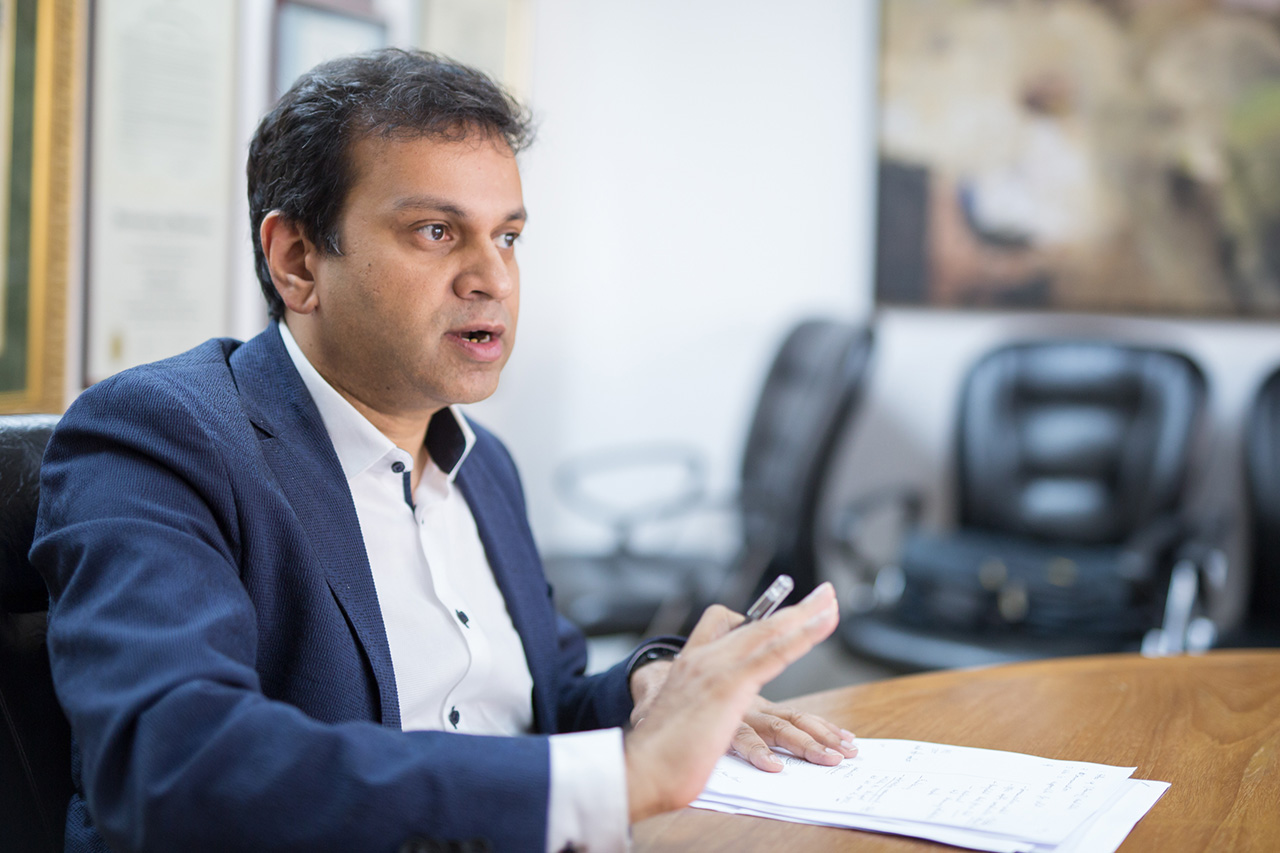
100,000 BRAC staff, volunteers working in communities to raise awareness.
BRAC has instructed all non-essential staff working at its head office in the capital’s Mohakhali to stay at home and work online from 22-25 March as a preventive measure against the Novel Coronavirus (COVID-19) infection. Approximately 2,000 members of staff work at the head office and non-essential employees constitute those who are not involved in responding to the coronavirus crisis.
BRAC Executive Director Asif Saleh said the decision has been taken as part of BRAC’s initiative to support the National Response Plan to maximise the organisation’s impact. The staff will be notified of further actions by Thursday, 19 March.
All BRAC staff at the field offices across the country will also maintain curtailed activities, Saleh said.
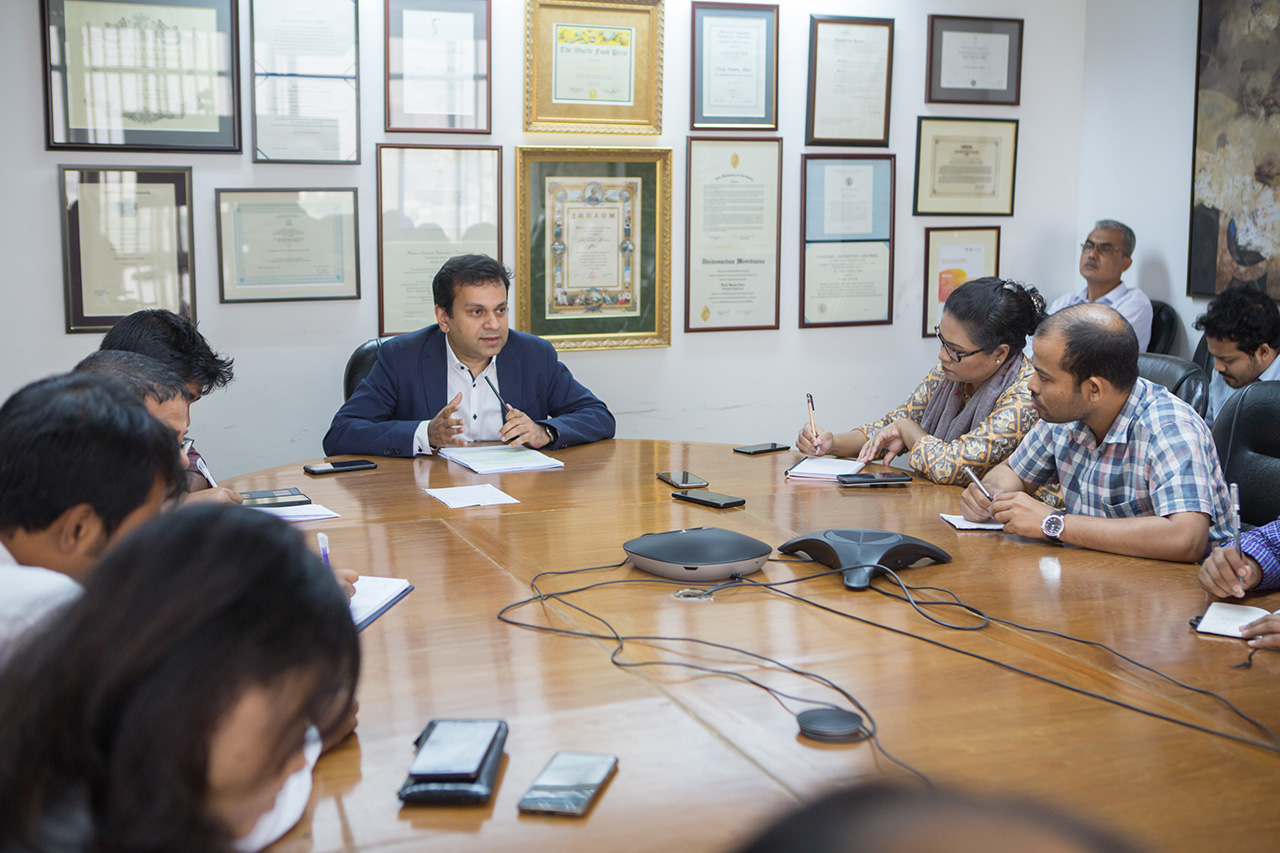 He also urged employees to avoid non-essential travels and said the interim measures will continue for a week, adding the decision will be reviewed on 28 March.
He also urged employees to avoid non-essential travels and said the interim measures will continue for a week, adding the decision will be reviewed on 28 March.
In the meantime, BRAC’s field officials working under different programmes across the country have been instructed to join the force of its health programme and act as health volunteers in different awareness campaigns for Coronavirus prevention.
“We have 50,000 community health volunteers across the country and 45,000 members of our own staff have joined the force to raise awareness against Coronavirus,” Saleh said.
Aside from working in the fields, BRAC is using its social media platforms to raise awareness. Relevant content on proper handwashing and respiratory hygiene is being regularly promoted through BRAC Facebook page and blog. BRAC has also set up a dedicated web portal http://www.brac.net/covid19/ on BRAC website where people can access concrete, reliable and updated information.
Having said that, BRAC is fully prepared to assist the Government of Bangladesh in its fight against Coronavirus. Asif Saleh also called upon the authorities to decentralise the COVID-19 testing facilities across the country to deal with the situation more efficiently.
“Currently, the Institute of Epidemiology, Disease Control and Research is the sole authority to test Coronavirus. Considering the huge number of service seekers, the government may decentralise the facilities to other hospitals across the country with necessary kits to help provide identification and treatment services,” said Saleh.
Join the world’s biggest family

